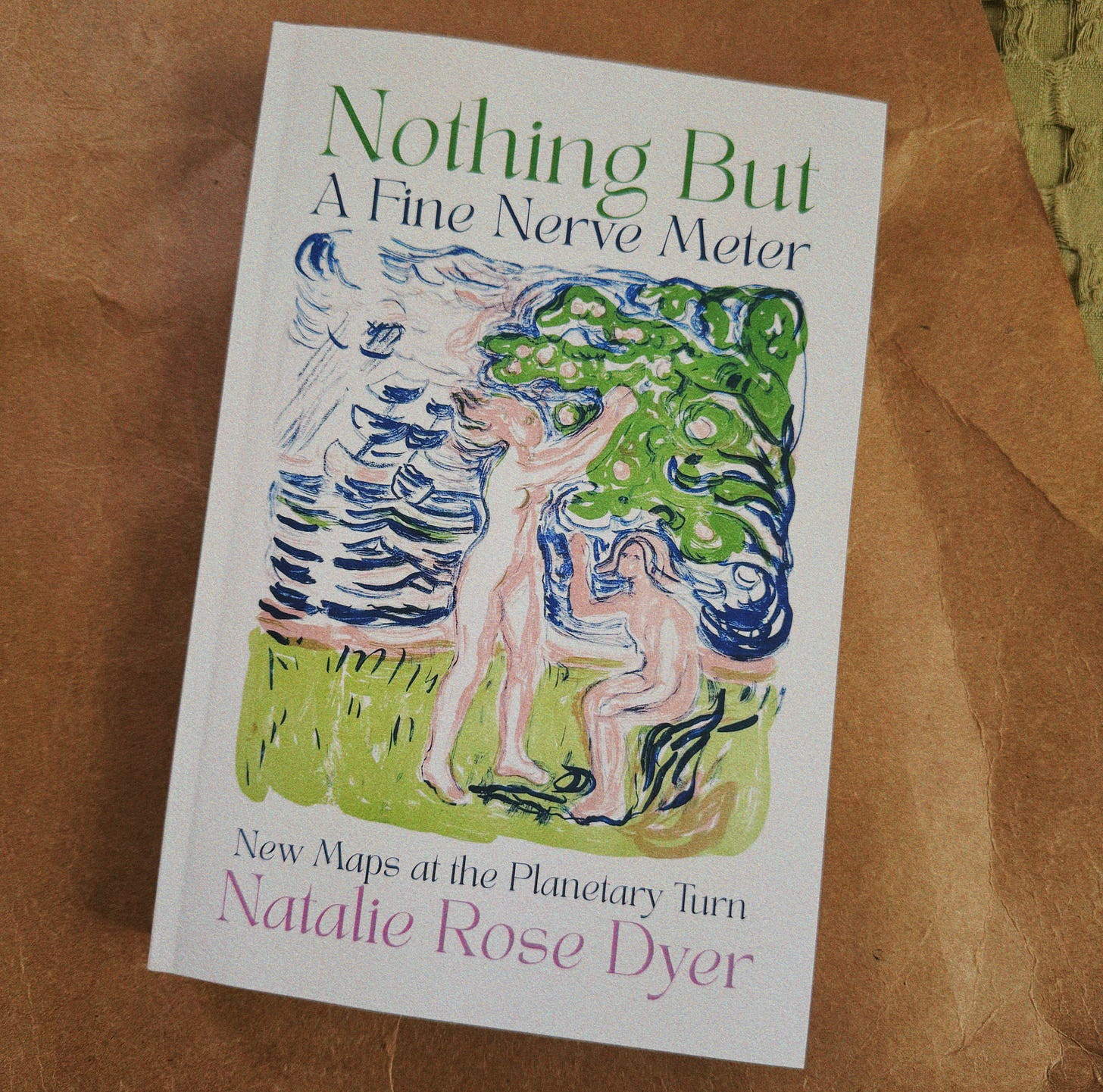Making new maps at the planetary turn
Introducing 'Nothing But A Fine Nerve Meter' by Natalie Rose Dyer
Every so often, a book arrives that doesn’t just offer an argument but a new cartography of the self. Natalie Rose Dyer’s Nothing But A Fine Nerve Meter: New Maps at the Planetary Turn is that kind of book. It is a work of poetics and praxis, a manual for re-writing the self at a moment when end-stage capitalism is harvesting our identities like crops. In the same way Revolt has always published texts that refuse containment—books that create their own readerships rather than slot neatly into markets—Dyer’s work is a declaration that identity is not a marketing category but a terrain for artistic and planetary experiment.
Dyer begins with the recognition that we are living inside an economy of performance. Social media demands endless self-disclosure, endless signalling of positionality. And yet this apparent “liberation” can harden into a false freedom, a marketable self we must maintain like an unpaid intern. She writes that capital requires identity to produce value: it feeds on our markers and algorithms. If Revolt exists for anything, it’s to prise open this machine—to publish work that helps artists, thinkers and readers write themselves differently, on their own terms.
What makes Nothing But A Fine Nerve Meter so electrifying is that it does not stop at critique. It offers a practice: poetic writing as a counter-currency. For Dyer, poetry and poetic prose are not a decorative escape but the most adequate form for “writing-of-rift,” the only mode able to register how porous and relational we truly are—human, animal, vegetal, mineral, digital, spiritual. This is the planetary turn she maps: away from rigid identity and towards kinship, immersion, and what Donna Haraway calls “worlding-with.”
As a publisher and as a writer myself, I am drawn to this call because it echoes Revolt’s founding impulse. We wanted an imprint that would not only “add to the conversation” but change the conversation’s grammar, make room for forms of writing that act as living testimony, activism, and aesthetic risk all at once. Dyer’s book does exactly that. She shows how narrative therapy, poetic fault lines, and deliberate wayfaring can become acts of resistance—refusals of patriarchal scripts, capitalist extraction, and the separations we are taught to accept as inevitable.
Her preface alone contains a moment that reads like the beating heart of the book and, in a way, the heartbeat of Revolt. After attending a self-help seminar designed to break inherited mythologies, Dyer describes a vision, or rather, three: a colossal bird, a First Nations elder writing in the dirt, her own family before an A-frame house. These images—flight, lineage, groundedness—become her call to power. They are also a manifesto for the creative life. To be an artist, she implies, is to write with a twig in the dirt, to stray from prescribed paths, to risk visionary contact, and then to return and testify.
This is why Nothing But A Fine Nerve Meter feels so necessary now. It does not ask us to erase difference, nor does it romanticise transcendence. Instead, it invites us to trade our idiosyncratic identities for “an infinite identity now and then”—to experience the temporary lifting of separation so we can return to our work, our communities, our activism, and our art differently. In the age of extractive content, this is not a luxury; it is a survival skill.
For readers and writers in the Revolt orbit, Dyer’s book offers both a mirror and a map. It’s a mirror because it shows us how easily our creativity can be reduced to algorithmic signals. It’s a map because it charts poetic and planetary routes out of this reduction. It gives permission to drift, to record, to safeguard places and lineages under threat. It is an argument for writing as a form of kinship, for leadership as listening, and for publishing as an act of affirmative world-making.
We founded Revolt to publish books like this—books that cross borders rather than reinforce them, books that teach us how to be porous and courageous and awake. Nothing But A Fine Nerve Meter is more than a book; it is an invitation to practice a different kind of authorship, a different kind of readership, a different kind of planetary being.


